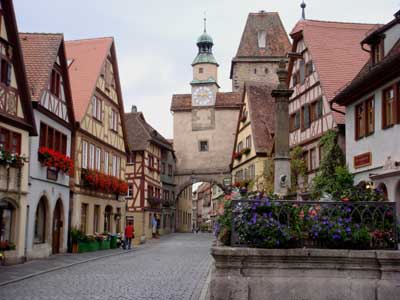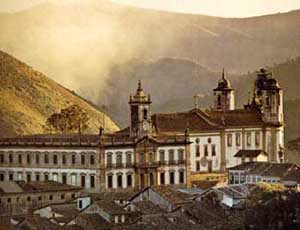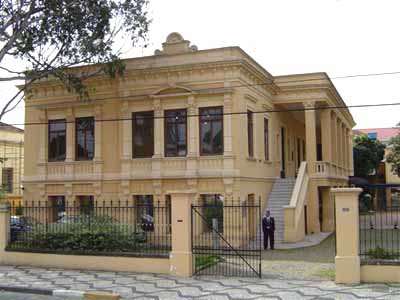 |
Organic Society
An Élan for Perfection
Should Exist in All Classes
Plinio Corrêa de Oliveira
Something the history books do not tell us – they make only incomplete references at times – is the demand the medieval people made of merchants to increasingly improve the quality of their merchandise.
We see this trend, for example, in the demand and production of fabrics made in northern Italy, which gradually increased in quality and excellence. We also find some people in Switzerland and Germany along the borders of the Rhine who had this upright desire to have better merchandise, in order to make their lives more civilized, cultured and elevated.
This desire was partially encouraged by the feudal Lords who used to provide the good example of a noble and dignified lifestyle.
This tendency was not principally a growth of commerce; it was a spiritual growth. It was an élan for the more perfect, a twin sister of religious and intellectual perfection. The desire for better merchandise constituted a part of this ensemble. Everything was rising together.

Above, the Benedictine Abbey of Mont Saint Michel, France; Below, the opulent library in Kremsmunster Abbey, Austria, is at the service of the monks
 |
What was the base for this élan? It was the sacral and noble character of Christian Civilization. The largest Religious Order of the Middle Ages was the Benedictine Order, whose concept of poverty was different from the others. The Benedictines say: “We are a rich Order of poor monks.” That is, even though their monasteries are wealthy, the monks do not have an opulent lifestyle. They are given what is sufficient to live with dignity.
This is not the Franciscan position, whose monks under the standard of poverty renounce all material things. Instead, the Benedictine concept of poverty is that the monk has nothing, governs nothing, and obeys in everything – but receives enough to live decently. So, his position is that of a poor monk living in a rich monastery.
This notion of having rich things for the glory of God and the grandeur of their Order led the Benedictines to build very beautiful abbeys and churches. In this way their influence encouraged the Middle Ages to have a constantly growing desire for perfection and a higher civilization.
The noble was perhaps the first social by-product of this Benedictine mentality. The noble was a man who had the obligation to give his blood for the defense of his people – called the impôt du sang [blood tax]. Further, he governed the people and administered justice to them with all the duties and problems these jobs entail. Therefore, it was fair that he should be recompensed with a proportionate degree of refinement and richness around himself. Again, similar to the monks, this opulence was not principally for his personal pleasure, but to elevate the role with which he was invested and to fit its correlated dignity.
I believe that I need to say this to explain the ascendant movement of the Middle Ages. If the whole society has a strong desire for noble things, this in itself practically obliges its elites to rise in perfection. For instance, even if today’s English Royal Family does not desire everything that it represents, it is obliged to at least look as if it does in order to fulfill the expectations the average Englishmen still has of these noble things. If the Royals did not follow this tone, they would lose everything.
These same expectations were held for the feudal Lords, with the difference that here, both the Lords and the people desired to advance together in a life of better quality.
The dichotomy between country and city life
An interesting question: City life can often appear to be more excellent than rural life because it is removed from many prosaic aspects of country living and invites one to a more civilized life. It has a potential for excellence, then, that country life lacks. Is this statement right or wrong?

Rothenburg impresses the visitor with its charm, tranquility and order |
The answer is nuanced. Because of the general deterioration of the sacral spirit and the admiration for nobility that was present when cities were born, they were not marked with that same vigorous ascendant spirit that marked rural life. For this reason, it is difficult to imagine how urban life would be if the sacral spirit and admiration for nobility were present.
Rothenburg has this sacral spirit. It does not have much, but something of the sacral is present in it. However, this spirit was more present in the medieval fief. I will try to explain: Rothenburg surprises the modern man when he sees a city so recollected, tranquil, and well-ordered. He feels a great peace of soul when he is inside that order.
Nonetheless, if a demanding critic were to examine Rothenburg, he would say that it lacks the sense of the marvelous. It has a very good order that conforms to Catholic doctrine, but it is turned toward itself. One does not sense in it a life turned toward Heaven. It is a life turned toward enjoying itself.
In the fief it was different.

Ouro Preto: a city of many churches but a center of revolution |
Cities exist as part of Natural Law. They always existed. But the medieval cities – about which I am speaking – were born or developed without that strong élan for sacrality and nobility that characterized the birth of Feudalism. I am not criticizing the cities in themselves, but rather analyzing this particular aspect of the medieval cities.
The solution to this problem is not simply to build many churches, convents and monasteries in a city. In Brazil we have cities with a considerable number of churches, such as Ouro Preto in the State of Minas Gerais. Nonetheless, it was precisely that city that gave birth to the Masonic movement calling for the separation of the Church and State. Ouro Preto, the artistic center of the State of Minas Gerais with its baroque churches decorated with gold and sculptures, was also the focus of the republican uprising that set the country afire to abolish the Brazilian Empire.
How should a sacral city be?
Can we imagine a city that would have this élan for the sacral? I believe it is difficult to discuss this in theory, because an organic city cannot be planned. A seed is planted, and a city germinates from it. So, let me give an example of an organic city that I knew, to see if we find elements for a solution.
In the São Paulo where I was raised, before the industrial revolution completely changed it, there were many wealthy farmers in the countryside who used to spend part of their time in the city with their families. For this purpose, they built splendid mansions, almost palaces. But by an instinct that is very Brazilian, instead of placing all these mansions in an exclusive neighborhood for the wealthy, a man would build his fine home in an area with many simple houses around it. This was how the neighborhood of Campos Eliseos was established.
So, next to an elegant mansion there was the simple house of a seamstress, who worked from her house as she took care of her children during the day, while her husband worked somewhere else a short distance away. They were a simple working couple. The whole neighborhood was comprised of a few grand houses of wealthy families scattered among the houses of the little people.

A good-family house on Campos Eliseos
|
In such a situation, the wealthy showed a great goodness toward the workers living around them. Should one of these working people need something, they would naturally ask his wealthy neighbor. Any tragedy or bad thing that happened to members of these working families would be known shortly by the good families, who would offer their help.
For example, the matron of the grand house would send her daughter with some special medicine or a gift for an ailing neighbor. At other times the lady of the house would ask her own doctor to visit the sick child of a humble family. Yet other times, it was the head of the well-to-do household who would offer some extra job to a member of a worker family because he knew that the family was in need of money.
Later, the mother of the family that received help would go to visit the lady and thank her. They would converse amiably together for a while in an ambience filled with respect and goodness, and then each one would genially return to her own world.
Good families like these became the focal point of admiration in the neighborhood, a kind of marvelous world for those working families living around them. When the sons and daughters of the grand families arrived home in their nice cars and ascended the marble stairs leading to the front door, the working-class family members were looking out their windows to admire them.
Then, going to the living room and standing in its balcony, the son of the landowner would greet some of those workers by name: “How have you been, José? Is your little Isabel better from her cold?” Those workers would never forget those small courtesies. For the rest of their lives they would not hesitate to greet – with the highest consideration – the members of the higher-class family when they would meet them in the streets, with the certainty that they always would be treated with goodness and respect.
This example of the small São Paulo that I knew when I was a boy [Prof Plinio was born in 1908] may give you an idea of how a sacral people can be turned toward the admiration of the nobility. I maintain that the simple people have a natural tendency to admire the nobility. It is only when they are poisoned by the Revolution that they revolt.
From this description, one can also see that cities should not be divided into exclusively rich or poor neighborhoods. This paves the way for class-struggle instead of a natural harmony and amiability among the classes.

Posted November 18, 2009

  | | Prof. Plinio |
Organic Society was a theme dear to the late Prof. Plinio Corrêa de Oliveira. He addressed this topic on countless occasions during his life - at times in lectures for the formation of his disciples, at times in meetings with friends who gathered to study the social aspects and history of Christendom, at times just in passing.
Atila S. Guimarães selected excerpts of these lectures and conversations from the trancripts of tapes and his own personal notes. He translated and adapted them into articles for the TIA website. In these texts fidelity to the original ideas and words is kept as much as possible.

Related Topics of Interest
 How Man Should Act over His Natural Environment How Man Should Act over His Natural Environment
 Tradition, Stagnation and Progress Tradition, Stagnation and Progress
 The Medievals Were Barbarians... The Medievals Were Barbarians...
 The Natural and Unnatural Decline of the Clan The Natural and Unnatural Decline of the Clan
 Organic Society and a Desire for Heaven Organic Society and a Desire for Heaven
 The True Friends of the People Are Traditionalists The True Friends of the People Are Traditionalists
 The Immaculate Character of the Catholic Church The Immaculate Character of the Catholic Church
 Revolution and Counter-Revolution - Overview Revolution and Counter-Revolution - Overview

Related Works of Interest
|
|
Organic Society | Social-Political | Home | Books | CDs | Search | Contact Us | Donate

© 2002-
Tradition in Action, Inc. All Rights Reserved
|
 |
|